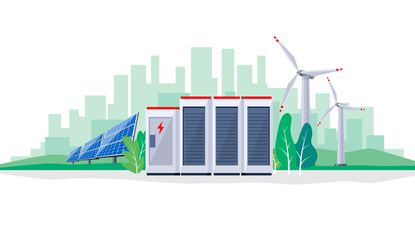The UK Government has announced that it will relax planning legislation around the construction of large-scale batteries, to make it easier for energy storage systems to be developed. It’s hoped that by loosening these restrictions, the number of batteries on the country’s electricity grid could be trebled to over 100. It's also thought that the storage cells themselves will be up to "five times bigger" than those currently in use. The Government wants these batteries to primarily be used to store renewable energy from the country’s wind and solar farms.
Wider potential benefits could involve the creation of more jobs in the green energy sector, while the increased efficiency and supply of renewables could mean a reduction in energy costs for consumers - which means lower bills. It’s also another example of the UK’s efforts to lower carbon levels and hit Net Zero by 2050.
We're still some way off seeing these benefits, however. The fastest way to reduce your bills in the meantime is to carry out an energy comparison and switch to the best energy deal in your area.
- Lower your energy bills: compare prices in your area now
A ‘smarter’ electricity grid
These legislative changes will mean that storage projects over 50 megawatts (MW) in England and over 350MW in Wales will be approved. More green energy resources can then be "stored and used all year round". Presently, planning permission is needed from local authorities before such projects can be rolled out.
The Government has also stated that these battery technologies will be a part of the country’s ‘smarter electricity grid’, which will support a wider integration of low-carbon power sources. It predicts that this could lead to savings of up to £40bn by the middle of the century.
Managing peaks and troughs in demand
It's hoped that large-scale batteries can be used to keep the National Grid’s green energy levels more consistent, and help manage demand more effectively.
Despite having the "largest installed capacity of offshore wind in the world," the speed and availability of wind isn't always a constant in the UK. That means that green wind energy is sometimes created when we already have a surplus. At other times, only low levels can be produced.
Having more - and larger - batteries in place should help the Grid handle surplus energy. It should also work to keep the overall mix of renewables on the Grid at higher levels when generation is not as productive.
The UK Minister for Energy and Clean Growth, Kwasi Kwarteng, has described the Government’s move as “key to capturing the full value of renewables”. He championed the plans as a means of fostering the UK’s “smarter electricity network” and “creating more green-collar jobs”.
The Head of Markets at electricity system operator National Grid ESO, Katye O’Neill, also praised the plans, stating that the battery storage will “manage the peaks and troughs in demand”, and help make the electricity system more efficient, keeping costs down for consumers.












